#the lesser saints
Text
22 notes
·
View notes
Text

#hazbin hotel#vivziepop#the onion#saint peter#saint peter hazbin hotel#hazbin hotel saint peter#image edit#welcome to heaven#lesser queue of solomon#(yes the third dancer is obviously not a furry)
58 notes
·
View notes
Text
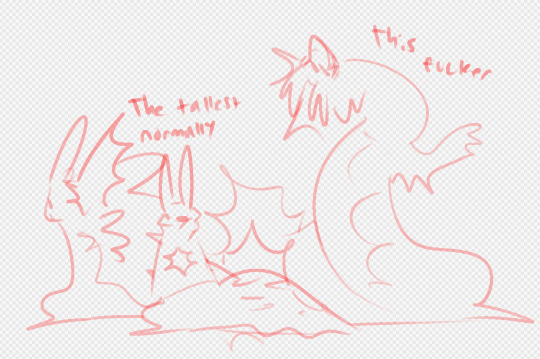
pushing my shapeshifter enot agenda /j
#rain world#that critter is FUCKED UP!!!!#they can only do that because its a weird god thing existing in like two or more universes at any given moment#enot is allowed to be really fucking unnatural as a treat#the other godlike scugs [saint and nightcat] also do their own respective Weird Shit but nightcat to a lesser degree
15 notes
·
View notes
Photo

Lá Fhéile Pádraig Sona Duit!
(“Happy Saint Patrick’s Day to you” in Gaelic)
Saint Patrick’s Day is a celebration of Irish culture and heritage held annually on March 17th in most English-speaking countries and regions with an Irish diaspora. The shamrock is the symbol of Ireland but what, botanically speaking, is a “shamrock”?
The word comes from the Irish Gaelic word “seamrog” which means “little clover”, but this is simply a common name that can apply to several clover-like plants native to Ireland. All clover species belong to the genus Trifolium, which is a member of the Fabaceae plant family which includes peas and beans. The genus name Trifolium literally means “three leaves” in Latin and clovers almost always bear a leaf composed of three equally sized leaflets. Four leafed clovers can occur in almost all clover species and are thought to be the result of a recessive genetic mutation due to their rarity. The three leaflets symbolise the Holy Trinity in Irish culture, and it is said Saint Patrick used the plant to help explain Christian teaching during his mission to convert the Irish to Christianity.
There is no single species exclusively officially known as a “shamrock”. Several clover species are commonly called shamrocks in Ireland, including the Red Clover (Trifolium pratense), White Clover (Trifolium repens), Purple Clover (Trifolium pratense purpureum), and Lesser Trefoil (Trifolium dubium). An edible wild plant called Wood Sorrel (Oxalis acetosella) is also commonly called a shamrock. Despite the visual similar to clover leaves, the Wood Sorrel belongs to a different plant family and is only distantly related to true clovers.
If you’re putting up shamrock decorations or wearing festive clothes adored with shamrocks today, see if you can decide which species is the true shamrock.
#katia_plantscientist #plants #botany #botanical #botanicalphotography #saintpatricksday #saintpatricksday2023 #ireland #irish #irishculture #nature #clover #woodsorrel #whiteclover #redclover #trefoil #shamrock #plantidentification #plantfacts #leaves #cloverleaf #green #saintpatrick #flowers #plantbiology #trifolium #fabaceae #oxalis #wildflowers #plantscience
#katia plant scientist#plants#botany#botanical#photosynthesis#saint patricks day#Ireland#irish folklore#nature#clover#wood sorrel#white clover#red clover#lesser trefoil#green#wildflower#oxalis#plant biology
7 notes
·
View notes
Text
SAINTS OF THE DAY (May 3)

Philip was born in Bethsaida in Galilee and was one of the Twelve Apostles that Jesus called.
He was the founder of Christianity, whose teachings influenced the Greco-Roman world and Middle East in the 1st and 2nd centuries CE.
Although Philip is included in the lists of the disciples in the Gospel of Matthew, the Gospel of Mark, and the Gospel of Luke, the only information about his life comes from the Gospel of John.
However, St. Philip is an important saint in Catholicism who is associated with the story of Jesus' miracle of loaves and fish.
When Jesus wanted to feed a crowd of 5,000 people, Philip was the one who asked how they would be able to afford and where they would be able to buy enough food to feed that many people.
Jesus, planning a miracle, accepted five loaves of bread and two fish from a boy.
He then divided the food into portions to miraculously feed all of the people.
Moreover, Philip began to convert others, finding his friend Nathaniel and telling him that Jesus was the one whom Moses and the other prophets had foretold. He also helped the Gentiles learn about Jesus' teachings.
James the Lesser is called “Lesser” because he was younger than the other Apostle by the same name, James the Great.
He was Jesus’ own cousin — his mother was sister or cousin to Mary.
Legend says that he looked so much like Jesus that Mary herself could have confused them, and this is why Judas betrayed Jesus with an identifying kiss for the authorities.
This James was one of the first witnesses of the resurrection and received a special appearance from Jesus before he ascended to heaven.
He was bishop of the Church in Jerusalem and was held in high esteem — he spoke for the people, for instance, in some of the important decisions of the early Church.
St. Paul consulted with him before starting his missionary journeys and referred to him as a “pillar of the Church."
He was known in Jerusalem as “The Just One” because of his constancy in prayer and for the devotion with which he practiced his faith.
He did not eat meat, he refrained from any ostentation in clothing, he did not drink wine, and he did not cut his hair.
He spent so much time in prayer that his knees grew thick callouses and looked like a camel’s.
The leaders in Jerusalem were worried about the growing number of people who were coming to believe that Jesus was the Christ.
They asked James to refute this claim, but he refused and was stoned.
He was finally killed when he was struck on the head with a club, and his body was cut to pieces with a saw.
He is the patron saint of pharmacists because they work with a pestle, which resembles a club.
He is frequently portrayed in art with the instruments of his death, a club or saw, or with a book, signifying his authority in the early Church.
4 notes
·
View notes
Text
other thing I like about The Wire, it doesn’t like to do big Message moments. like sure, they do it now and then, but it’s often deliberately undercut by showing the character making the statement to have moral failings as well, showing that there’s reasons why these good principles don’t work out in practise, and even, why people end up doing unethical things because there are real life hurdles for trying to do things the right way.
#fully Ethical characters tend to be bit parts and again don’t tend to have scenes independant of some main character#there include the Landscaping Guy who employs Cutty#Waylon who’s only given flaws in the form of backstory but otherwise is a saint#Frank Sobotka’s brother who refuses the money and no show job#Slim Charles gets close to clean though he definitely is a killer#Butchie Brother Mouzone Lester all have their worst actions be pushed by curcumstance#there are lesser characters with plot signifigance that are shown to be right and morally uncompromised#but basically everyone else has some moral entanglement and can be right about things but also hypocrites to a degree#I’m on the fence about Daniels and that’s really contingent on how much one believes there’s good he can do through the police
4 notes
·
View notes
Text

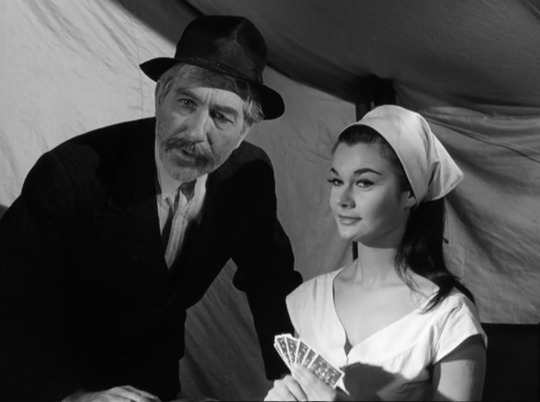

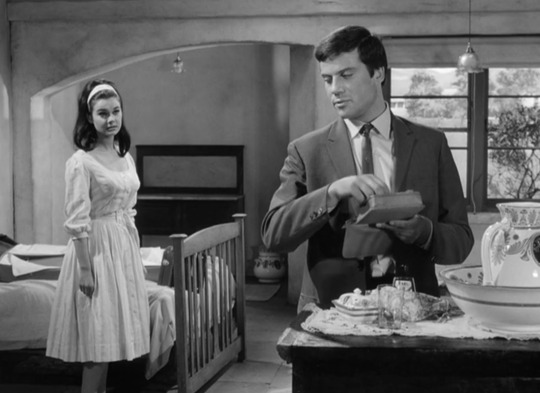
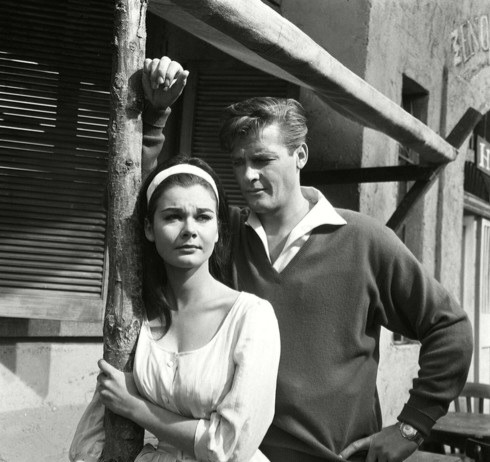
The Saint: Sophia (2.24, ITC, 1964)
"Professor, what is the meaning of this? What is going on?"
"It's rather an elaborate plot, I'm afraid."
#the saint#sophia#itc#1964#leslie charteris#roger moore#robert banks stewart#oliver reed#imogen hassall#tommy duggan#peter kriss#john wentworth#hal galili#wolfe morris#andreas malandrinos#raymond ray#tony arpino#donna pearson#Reed's second episode gives him a meatier role than his first but true to form (at least according to popular legend) he managed to get#injured again; where King of the Beggars (2.9) had seen him with a full concussion‚ here he received a lesser head injury in the scene#where his character is menaced by Greek locals. yes we're in Greece‚ for another sort of morality tale‚ as Simon tries to teach Olly not to#be a horrible crook or to pay his debts or something... it doesn't really work‚ unless threats and blackmail are a good teaching tool. this#ep marked Moore's debut as a director; he'd continue to dabble with it throughout The Saint and later with The Persuaders. actually he#proves a very competent first time director; fond of close up‚ there's a lovely unspoken bit of business of Simon noticing Oliver is#carrying a pistol which is very effectively done. later another character will say that only dishonest men carry guns (no mention made of#Simon's habit for carrying). John Wentworth plays a Scots archaeologist but he's very clearly dubbed (and in fact i recognise the voice of#the dubbing artist‚ another character actor‚ but I just can't place it). his real voice can be heard only once‚ an excited exclamation as#he enters the inn having discovered a golden statuette. the ep is named for Hassall's character but she alas doesn't have a great deal to#do in the plot (and is offscreen for much of the second half)#sadly this was to be a consistent theme in her short and rather sad career (she took her own life in 1980 aged 38)
14 notes
·
View notes
Text
god cursed me with being pretty and talented and perceptive and well educated and good at cooking/cleaning and all-around the perfect wife. except for the luxury bag addiction :(
#im visiting a relative in paris in may and my credit card is shaking already#most ultraluxury bags are ugly imo (other than saint laurent my beloved) but the lesser known brands are so worth it#there is literally no aspect of my life that I feel compelled to shop other than bags like I dont even browse vgames or clothing this often#personal
0 notes
Note
patron saint of vampires. and perhaps caffeine
This made me smile thank you.
psa. I only bite if caffeine is in the blood now. + if you have vitamin d that also helps.
0 notes
Text
you see i would love to engage with other saints row people but i fear being Cringe
#mar.txt#saints row#why am i main tagging? good question#you know what for good measure#monster hunter#<- tagging that too since my sr oc is a crossover oc#a versa pietru who's a rouge angel of truth that just. fucked off from his own world#was under the domain of one of my other ocs,one of the creator gods#currently in the process of becoming a fallen angel#pietru works nicely for this concept since it has two versions,versa (the 'light' version) and makili (the 'dark' version)#his name is uriel and he's a bitchy cat that is sadistic power hungry and tends to view mortals as disposable and existing solely for the#amusement of the divines such as himself#he views them as fundamentally lesser than dragons and even more lesser than divine beings#that SAID. joining with the saints led him to end up learning to value SOME human life as he begrudgingly ended up becoming fond of some of#them. cough cough johnny (bossgat brainrot :girlhelp:....). he's very very protective of them but still incredibly dismissive of other#mortal life#he gets to have the freedom to do what he wants (see: murder and violence and etc etc) in this world where he couldn't in his own so he#relishes in it and is quite loyal to the saints#by the events of 4 he ends up being fairly protective of everyone that's left,even if he IS still the equivalent of a grumbly surly cat to#everyone except johnny.... he shows his fondness in his Own Ways™️#good fucking gods i sound so cringy what the fuck im going to explode into a million pieces of viscera why am i maintagging both fandoms#head in hands head in hands head in hands h#oc tag: uriel
1 note
·
View note
Text
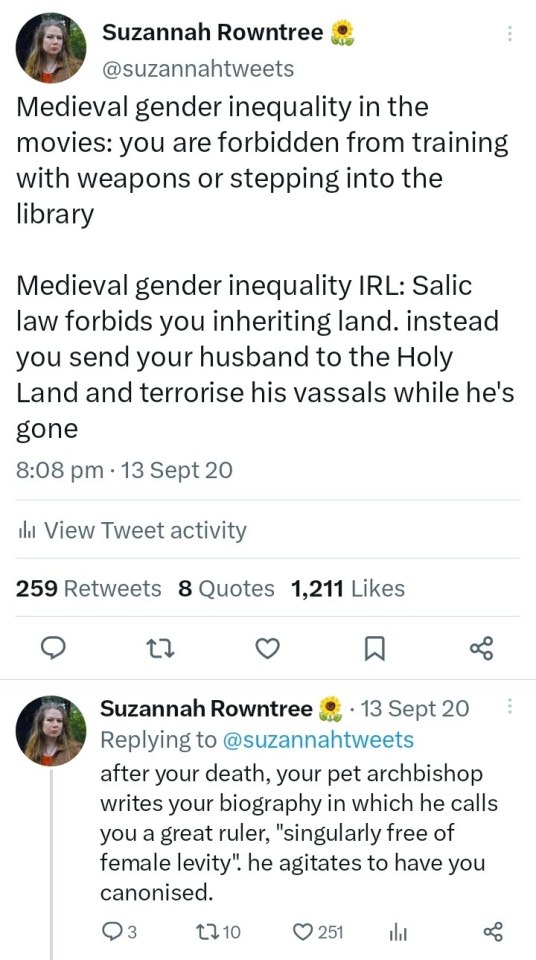
all RIGHT:
Why You're Writing Medieval (and Medieval-Coded) Women Wrong: A RANT
(Or, For the Love of God, People, Stop Pretending Victorian Style Gender Roles Applied to All of History)
This is a problem I see alllll over the place - I'll be reading a medieval-coded book and the women will be told they aren't allowed to fight or learn or work, that they are only supposed to get married, keep house and have babies, &c &c.
If I point this out ppl will be like "yes but there was misogyny back then! women were treated terribly!" and OK. Stop right there.
By & large, what we as a culture think of as misogyny & patriarchy is the expression prevalent in Victorian times - not medieval. (And NO, this is not me blaming Victorians for their theme park version of "medieval history". This is me blaming 21st century people for being ignorant & refusing to do their homework).
Yes, there was misogyny in medieval times, but 1) in many ways it was actually markedly less severe than Victorian misogyny, tyvm - and 2) it was of a quite different type. (Disclaimer: I am speaking specifically of Frankish, Western European medieval women rather than those in other parts of the world. This applies to a lesser extent in Byzantium and I am still learning about women in the medieval Islamic world.)
So, here are the 2 vital things to remember about women when writing medieval or medieval-coded societies
FIRST. Where in Victorian times the primary axes of prejudice were gender and race - so that a male labourer had more rights than a female of the higher classes, and a middle class white man would be treated with more respect than an African or Indian dignitary - In medieval times, the primary axis of prejudice was, overwhelmingly, class. Thus, Frankish crusader knights arguably felt more solidarity with their Muslim opponents of knightly status, than they did their own peasants. Faith and age were also medieval axes of prejudice - children and young people were exploited ruthlessly, sent into war or marriage at 15 (boys) or 12 (girls). Gender was less important.
What this meant was that a medieval woman could expect - indeed demand - to be treated more or less the same way the men of her class were. Where no ancient legal obstacle existed, such as Salic law, a king's daughter could and did expect to rule, even after marriage.
Women of the knightly class could & did arm & fight - something that required a MASSIVE outlay of money, which was obviously at their discretion & disposal. See: Sichelgaita, Isabel de Conches, the unnamed women fighting in armour as knights during the Third Crusade, as recorded by Muslim chroniclers.
Tolkien's Eowyn is a great example of this medieval attitude to class trumping race: complaining that she's being told not to fight, she stresses her class: "I am of the house of Eorl & not a serving woman". She claims her rights, not as a woman, but as a member of the warrior class and the ruling family. Similarly in Renaissance Venice a doge protested the practice which saw 80% of noble women locked into convents for life: if these had been men they would have been "born to command & govern the world". Their class ought to have exempted them from discrimination on the basis of sex.
So, tip #1 for writing medieval women: remember that their class always outweighed their gender. They might be subordinate to the men within their own class, but not to those below.
SECOND. Whereas Victorians saw women's highest calling as marriage & children - the "angel in the house" ennobling & improving their men on a spiritual but rarely practical level - Medievals by contrast prized virginity/celibacy above marriage, seeing it as a way for women to transcend their sex. Often as nuns, saints, mystics; sometimes as warriors, queens, & ladies; always as businesswomen & merchants, women could & did forge their own paths in life
When Elizabeth I claimed to have "the heart & stomach of a king" & adopted the persona of the virgin queen, this was the norm she appealed to. Women could do things; they just had to prove they were Not Like Other Girls. By Elizabeth's time things were already changing: it was the Reformation that switched the ideal to marriage, & the Enlightenment that divorced femininity from reason, aggression & public life.
For more on this topic, read Katherine Hager's article "Endowed With Manly Courage: Medieval Perceptions of Women in Combat" on women who transcended gender to occupy a liminal space as warrior/virgin/saint.
So, tip #2: remember that for medieval women, wife and mother wasn't the ideal, virgin saint was the ideal. By proving yourself "not like other girls" you could gain significant autonomy & freedom.
Finally a bonus tip: if writing about medieval women, be sure to read writing on women's issues from the time so as to understand the terms in which these women spoke about & defended their ambitions. Start with Christine de Pisan.
I learned all this doing the reading for WATCHERS OF OUTREMER, my series of historical fantasy novels set in the medieval crusader states, which were dominated by strong medieval women! Book 5, THE HOUSE OF MOURNING (forthcoming 2023) will focus, to a greater extent than any other novel I've ever yet read or written, on the experience of women during the crusades - as warriors, captives, and political leaders. I can't wait to share it with you all!
#watchers of outremer#medieval history#the lady of kingdoms#the house of mourning#writing#writing fantasy#female characters#medieval women#eowyn#the lord of the rings#lotr#history#historical fiction#fantasy#writing tip#writing advice
29K notes
·
View notes
Text
Servant—SERIES FINALE: "Fallen"
Servant
4×10: “Fallen”
Directed by Severin Fiala & Veronika Franz
Written by Laura Marks
* For a recap & review of the penultimate episode, click here.
Leanne has presented Dorothy with a choice to have everything and anything she wants, including Jericho back on a permanent basis. And it’s not a clear choice for Dorothy. She requests a moment alone, asking Julian and Sean to go wait in the car.…
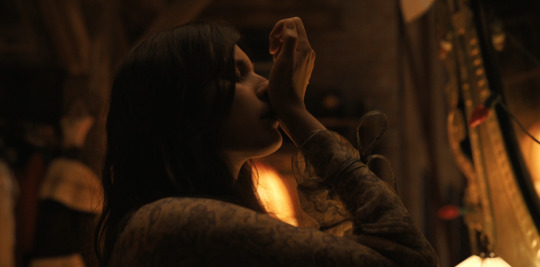
View On WordPress
#Angel Wings#Angels#Church of Lesser Saints#Cult#Dagger#Death#Fire#Nell Tiger Free#Series Finale#Severin Fiala#Veronika Franz
0 notes
Text
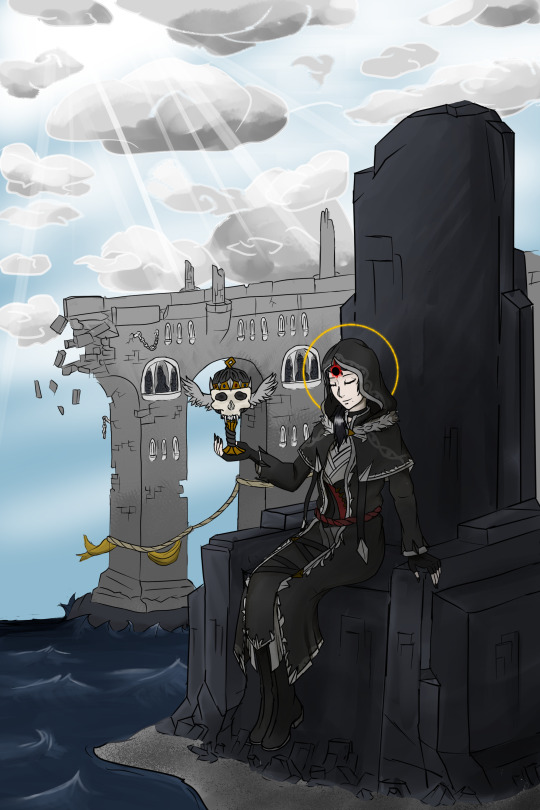
Have i posted this here yet?
I don't think i have.
1 note
·
View note
Text
tfw your little treat has been in illinois all fucking day long and now its not gonna get here until saturday :/
#oh my god i just want my little guy i need him so bad#come on fedex hes the fucking creator of the universe dont leave him in goddamn illinois#diary post#also would it be funny or cringe if i get asked in my religion class what religion i am. would it be funny to say i'm a sinnohese#be like yeah we have 1 main god and 3 other lesser deities#then we have a bunch of angel type guys as well. that control different things#something something 'we call our holy texts the old verses'#'my personal favorite is the god of chaos. we have like a confirmation saint type deal going on'#wait this is so funny. i could probably get away with it if i change the pronunciations#what if someone called me out tho that would be SO funny#'ummm she keeps referencing a video game. like thats all pokemon lore'#like yeah it is mind your business. so what if a little trauma gave me this nice treat#anyway the religion class fucking sucks so if i can jerk these south dakotans around that would make it a lot bearable#okay but unironically i might flesh this out bc it would probably help in my fanfic and ongoing daydream too#(and heads up to memus ive been fleshing out an act 2 for this already bonkers long fanfic...#youre gonna have a fucking book to read whenever i get around to finishing this thing)#okay easy day tomorrow. 1 class with all my besties then prepping judging samples then flexing on some kids for being good at eating chedda#then i get to go home. then on sunday im buying alcohol#wahoo
1 note
·
View note
Text
A Martyr From the Ashes
For everyone in the fandom saying saying that Danny thinks Martian ManHunter is cooler than Superman, we don't really see it all that much in writing.
I'mma try and fix that...
~•~•~•~•~•~
The Martian Book of Legends held the heroic tale of Saint Da'han'yul Fen'tuun of Mars, a sickly albino priest of a small town that held marriages, sermons regarding life and how it should be enriched and lived to its fullest, and specialized in funerals that used cremations with fire, a feat thought to be physically impossible by the masses. As people saw him look into the flames without fear while others cowered, rumors spread that the young man was blessed by H'ronmeer himself, the Martian God of Fire, Life, and Death.
People spoke about how Da'han'yul turned down all attempts at courtship, for he had decided to dedicate his life to bring light in the darkest times to all lives in the name of his God. He was a thing of beauty with a gentle soul and shy demeanor, even the Red and Green skinned who had still held a firm belief on the caste system could not deny his charm. How the terminally ill Martian carried on his mission with a smile, nobody knew.
However, tragedy struck on the day that should have spelled the beginning of the end for the Martian people. A parasitic species had invaded the Martian Homeworld and was causing untold havoc. As civilians fled from the threat and prepared a counter offensive, it was Da'han'yul Fen'tuun who charged into the danger headfirst to save his people from becoming prey.
As others pleaded for him to run away, in a great bright flash of light, a gigantic Martian loomed over the enemy emerged where the ill Martian stood, coated in flames in a form they've never seen before with a halo and body that burned a haunting green.
The deafening silence still held as the enormous creature brought a massive fist on the giant pale walker that was destroying homes. A wave of its hand sent a wall of green flames raced towards the foot soldiers, reducing them to ash while his people and buildings were not harmed in any form without an ounce fear of these fires the creature used to purge the enemy. Within the hour, the threat had been neutralized and peace was brought back to the red planet.
As the Martian people looked to the titan, they knew. H'ronmeer's had chosen his most loyal servant, Da'han'yul, as the avatar of his wrath to smite those who would bring his people harm. The people hugged and wept tears of joy and cheered for the priest and H'ronmeer for saving them, but the tears soon became tears of sorrow.
The giant groaned in pain as he fell on one knee as it began to crumble into ash before the people's very eyes. Like a flame, Da'han'yul Fen'tuun had burned his brightest when life needed him most, and now death called to him as it slowly extinguished it to give him peace. With a final message, he pleaded to his people to come together as one and to not see one another as lesser or greater than, but as equals who can help one another in the darkest of times and the hardships yet to come. With his final moments gone, a final telepathic embrace was given to all before he fell silent for the last time.
The massive pile of ash that were his remains was brought back to his little village and made into a beautiful garden of ash in the temple where the newly titled Saint made his home in, where it would be made a holy site that many would come to give their thanks and pay their respects for H'ronmeer' and his champion alike.
And for centuries, peace was held before it was shattered by Ma'alefa'ak, who unleashed the Fire Plague to take vengeance on his people for his inability to experience the psionic way of life that was the norm. His smile as his people screamed in anguish was knocked off his face in the most literal of terms when a Martian struck him down and had him by the throat.
A Martian with eyes burning in anger as Ma'alefa'ak failed to break free and was being beaten severely for his crimes against the people of Mars. A Martian made entirely up of ash and green embers.
Saint Da'han'yul Fen'tuun had returned, if only for a moment longer. And he was not happy.
Quickly, one by one across the planet, the martians set ablaze burned a gentle green that healed them. In this miraculous act of divine intervention, not a single Martian had lost their life. Most were now unconscious with labored breathing being heard.
J'onn watched on as his brother screamed in agony as his body burst into green flames as a pool of ash began to swallow his brother whole. Before disappearing entirely, Da'han'yul told him the punishment his brother would be facing.
"Ma'alefa'ak's psionic abilities have been awoken. He will be sentenced to become a living flame until he has lived the collective life span of all that he has tried to extinguish."
J'onn was too stunned to speak. With how long a Martian can live, it was the equivalent of telling him his brother would be suffering for an eternity. It seemed unethical, but he knew his brother had dug his own grave the moment he saw the reanimated remains of Da'han'yul Fen'tuun's ashes take swift action.
"Everything will be ok now, J'onn. Go to your family and tend to them.
"Da'han'yul...Thank you. I'm sorry I wasn't there to help you when you were still alive." J'onn solemnly uttered as he looked to the ground, unable to look at his deceased youngest brother.
"Nonsense J'onn, it's not your fault...The caste system...it–"
"I could've done more! Instead I saved myself instead of being there when my brothers needed me most!"
"J'onn...you were just a child."
"It makes none of it right!"
He was right in that aspect, but it still didn't feel right. Ma'alefa'ak' was ostracized by society, was treated like a freak of nature for lack of natural gifts and he wanted to burn society to the ground in the most literal of terms because of it.
While Da'han'yul, the forgotten youngest brother, was treated horribly for being albino and treated cruelly. He contracted a deadly disease when he separated himself from the family to live in isolation with other albinos that made him sickly and cut his life expectancy down severely. Knowing what befell him, seeing him struggle to move and hold down food at times while J'onn and their parents did nothing.
These tumultuous emotions sat in J'onn for so long. The way he wanted to go and help them both, but the fear of association and social punishment for merely being seen with his brothers made him cry when he younger for being so weak willed. It wasn't until their parents bragged about the sacrifice their forgotten child had made, the sone they purposely scorned made him snap.
"J'onn, promise to keep my message alive for me. Help our people become whole again."
"Of course, brother." Is what J'onn tells him as he watches his little brother vanish again for a third and final time.
#danny phantom#justice league#dc x dp#dp x dc#dp x dc crossover#dp x dc prompt#martian manhunter#The extinction of the martian people was never sullosed to happen#So Danny decided to fix it and was reborn into martian society#He was severely disappointed by the caste system so decided to dk something about it#Danny reincarnates into a little brother for Martian ManHunter because he still sees him as cool#H'ronmeer was the last dying god of Mars and accepted Danny's help to save his people.#M'gann is the first to find out that Danny is her uncle Da'han'yul Fen'tuun and she's going to pass out from shock#Danny is just going say 'hello J'onn' and just combust into green flames and go for the hug#Everyone is freaking out but are more surprised to see that he's hugging back with the same intensity and crying just as hard#Imagine being told that your coworker's little brother is a minor deity in his planets religion who saved Mars TWICE
790 notes
·
View notes
Text

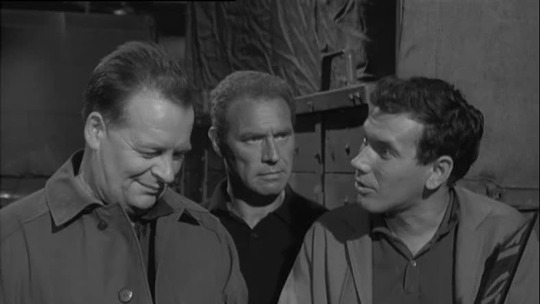

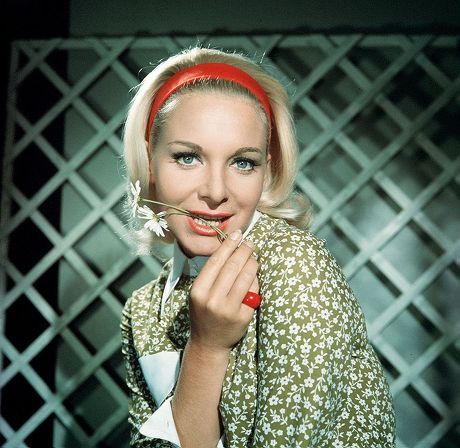
The Saint: The Hi-Jackers (3.11, ITC, 1964)
"Tell me, you've had an interesting career, haven't you?"
"Yes, but why the past tense?"
"A slip of the tongue."
#the saint#the hijackers#1964#itc#leslie charteris#paul erickson#david eady#roger moore#ingrid schoeller#robert nichols#neil mccallum#walter gotell#kevin scott#michael collins#richard shaw#shane rimmer#roy stephens#david healy#george herbert#a lesser effort perhaps‚ but free from any of the more objectionable elements that can be found in even the best Saint eps#simon is in Munich (and Moore may actually have popped there at some point; there's one very convincing establishing shot before the titles#which‚ if it's CSO‚ is among the best I've ever seen). he bumps into an old friend working on a US army base‚ which raises a few questions;#why was Simon even in Munich in the first place (the meeting is accidental) and just how does he get to make these friends? like Steed's#many old friends in The Avengers‚ the pal here is only really present to fulfil a narrative purpose. then it's picking up another (new) pal#and solving the case. Gotell is very underused as the boss bad guy‚ but Neil McCallum gets some lovely character stuff to do as a slimy#stooge. Schoeller would become something of a minor movie star on the European big screen‚ mainly in adventure spoofs and spy stuff and#she's very good here as a rare Saint girl who doesn't seem to fall for Simon's charms at all. this was Eady's only directing credit on the#series and actually a very rare case of him working for television; he worked mostly on quota quicky b movies and short films (he'd already#been Oscar nominated at this point for a short film). Erickson's script is a relatively faithful adaptation of a Charteris short story with#the rather wonderful title The Unlicensed Victuallers (tho i get why they changed it for tv)
2 notes
·
View notes